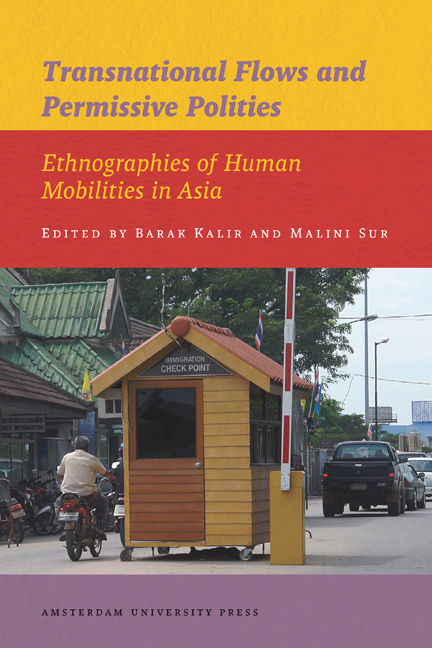Book contents
- Frontmatter
- Contents
- List of Tables, Maps, Figures and Photographs
- Acknowledgements
- Introduction: Mobile Practices and Regimes of Permissiveness
- 1 Illegality Rules: Chinese Migrant Workers Caught up in the Illegal but Licit Operations of Labour Migration Regimes
- 2 Contesting the State of Exception in the Afghan-Pakistani Marchlands
- 3 ‘Looking for a Life’: Rohingya Refugee Migration in the Post-Imperial Age
- 4 Smuggling Cultures in the Indonesia-Singapore Borderlands
- 5 Trade, Transnationalism and Ethnic Infighting: Borders of Authority in Northeast Borneo
- 6 Bamboo Baskets and Barricades: Gendered Landscapes at the India-Bangladesh Border
- 7 Moving between Kerala and Dubai: Women Domestic Workers, State Actors and the Misrecognition of Problems
- 8 Emigration of Female Domestic Workers from Kerala: Gender, State Policy and the Politics of Movement
- 9 Mainland Chinese Migrants in Taiwan, 1895-1945: The Drawbacks of Being Legal
- 10 ‘Playing Edge Ball’: Transnational Migration Brokerage in China
- Epilogue: Irregular Mobilities and Disjunctive Moralities
- About the Editors and Contributors
- Bibliography
- Index
- Publications Series
2 - Contesting the State of Exception in the Afghan-Pakistani Marchlands
Published online by Cambridge University Press: 15 January 2021
- Frontmatter
- Contents
- List of Tables, Maps, Figures and Photographs
- Acknowledgements
- Introduction: Mobile Practices and Regimes of Permissiveness
- 1 Illegality Rules: Chinese Migrant Workers Caught up in the Illegal but Licit Operations of Labour Migration Regimes
- 2 Contesting the State of Exception in the Afghan-Pakistani Marchlands
- 3 ‘Looking for a Life’: Rohingya Refugee Migration in the Post-Imperial Age
- 4 Smuggling Cultures in the Indonesia-Singapore Borderlands
- 5 Trade, Transnationalism and Ethnic Infighting: Borders of Authority in Northeast Borneo
- 6 Bamboo Baskets and Barricades: Gendered Landscapes at the India-Bangladesh Border
- 7 Moving between Kerala and Dubai: Women Domestic Workers, State Actors and the Misrecognition of Problems
- 8 Emigration of Female Domestic Workers from Kerala: Gender, State Policy and the Politics of Movement
- 9 Mainland Chinese Migrants in Taiwan, 1895-1945: The Drawbacks of Being Legal
- 10 ‘Playing Edge Ball’: Transnational Migration Brokerage in China
- Epilogue: Irregular Mobilities and Disjunctive Moralities
- About the Editors and Contributors
- Bibliography
- Index
- Publications Series
Summary
The so-called tribal areas in northwest Pakistan are in the international limelight due to its continuing significance for the political situation in both Afghanistan and Pakistan. Ever since the Soviet invasion of Afghanistan in 1978, these borderlands have been intrinsically connected to the war in Afghanistan. Millions of refugees have found a place to stay here during the last three decades. The Afghan resistance known as the mujahideen largely operated from these areas – both Al Qaeda and the Taliban as well as lesser-known jihadi groups were formed and trained from here, and it is widely believed that Al Qaeda leaders including Osama bin Laden himself had/have been hiding in this mountainous region. Today, the tribal areas are the arena in which the Pakistani army and militant organisations such as the Pakistani Taliban clash. The tribal areas have witnessed all this primarily because of its unique legal status as a part of Pakistan where the state has given up its formal authority to so-called tribal customary law. In effect, the region is ruled by what we will call the state of exception.
Our concern in this chapter is not primarily with the tribal areas as an arena of international politics. We are instead interested in the effect of the unique legal arrangement on the local population, and especially the ways in which the state of exception is contested. Clearly this is related to the international politics that is being played out within the tribal areas, but it cannot be reduced to that alone. A growing number of people in the tribal areas are no longer satisfied with their special status. Because the state of exception is based on the notion of tribal culture, it is precisely this ideological foundation that has come under attack from various sides. There are at present three discursive alternatives available: 1) Islam, 2) a redefinition of tribal culture in terms of Pakhtun nationalism and 3) references to modernity and the notion of universal civilisation. We will argue that these discourses are not just regimes of licitness in the sense that they depict existing power structures and cultural institutions as morally wrong or corrupt, but that they also endorse alternative legal systems – respectively, the shariat, a redefinition of customary law, and universal human rights or the Pakistani constitution. Each of these formations of licitness and legality legitimise certain power positions and contest others.
- Type
- Chapter
- Information
- Transnational Flows and Permissive PolitiesEthnographies of Human Mobilities in Asia, pp. 55 - 74Publisher: Amsterdam University PressPrint publication year: 2012



